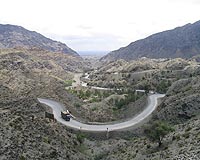| . |  |
. |
Dubai, United Arab Emirates (UPI) Jul 8, 2009 Lashkar-e-Toiba, the Pakistan-based Islamist organization blamed for the November 2008 attacks in Mumbai, appears to be challenging al-Qaida as the spearhead of the global jihad, thanks in large part to hefty funding from its networks in the Gulf. According to the Jamestown Foundation, a Washington-based think tank that monitors international terrorism, Indian intelligence investigations indicate that the Gulf states "have been the major hubs for Lashkar-e-Toiba terrorists." These funds have been used to finance plans for new attacks against targets in India, a July 2 Jamestown report said. Dubai has become the operational planning center for Lashkar, it said. It was not clear why this was done, but it probably stemmed from the international pressure on Pakistan to crack down on jihadist organizations based there following the carnage in Mumbai in which more than 170 people were killed by seaborne raiders. The Gulf has long been a source of financial support for jihadist groups like al-Qaida. The United Arab Emirates in particular has long been seen as a financial center for such groups. Lashkar primarily operated in disputed Kashmir, but in recent years has extended its attacks inside India and is showing all the signs of widening its operations even further on an international scale. Veteran Asia analyst Selig Harrison of the U.S.-based Center for International Policy observed in June that Lashkar is now more of a threat to the stability of Pakistan than the Taliban or al-Qaida. "Disarming Lashkar-e-Toiba should be the top U.S. priority in Pakistan because it would greatly reduce the possibility of a coup by Islamist sympathizers in the armed forces," he cautioned. Many of the details of the growing threat posed by Lashkar-e-Toiba emerged from the interrogation of Mohammed Omar Madni, a close associate of Hafeez Mohammed Saeed, head of the Islamic Jammat-ud Dawaa charity that is considered the front organization in Pakistan for the outlawed Lashkar. Saeed was arrested on Dec. 11, 2008, when Pakistan banned the charity in the wake of the Mumbai massacres. He was released on June 2 on the order of the Lahore High Court. Saeed is sponsored by wealthy Arab donors. Madni was arrested by Indian anti-terrorist police in New Delhi on June 4 while he was on a mission from neighboring Nepal to recruit new members in India to be sent to Pakistan for training, according to Indian security sources. Lashkar's expanding operational network now extends to Nepal, where Madni had established a base, and Bangladesh, where local jihadists have been active. But it is the Gulf connection that appears to be central to the organization's plans for further attacks against high-value targets in India that has grabbed the attention of India's intelligence services and its Western allies. Madni's brother Hafiz Mohammed Zubair, another Lashkar operative who works closely with him, is based in Qatar, Indian officials say. Other Lashkar attacks mounted before the November slaughter, including bombings in Indian cities such as New Delhi and Bangalore earlier in 2008, "were financed by Lashkar's Gulf cells and masterminded by Gulf-based operatives" based in Oman, Dubai and Sharjah in the United Arab Emirates, as well as Saudi Arabia, Jamestown reported. "These operations were carried out in collusion with militants of the Indian Mujahedeen and the proscribed Student Islamic Movement of India, known as SIMI." One of the key operatives in the Gulf, former SIMI leader Sarfaraz Nawaz who fled India during a crackdown on the student organization, was captured in Oman earlier this year. He was transported back to India by the country's foreign intelligence service, the Research and Analysis Wing, "in a dramatic secret operation," Jamestown said. Another key operative was identified as Ali Abdul Aziz Hooti, a businessman based in the Omani capital of Muscat and allegedly Lashkar's chief financier in the Gulf. Hooti is currently in Omani custody on charges of plotting attacks against Western targets in the sultanate and is suspected of links to the group that attacked Mumbai in November 2008. Another of Lashkar's Gulf connections came to light in mid-2006 following a series of commuter train bombings in Mumbai. The city's anti-terrorist squad seized large quantities of Saudi money at the home of Lashkar's top operative in Mumbai, Faizal Ataur Rehman Sheik. It had been sent in two installments by his brother Rahil, a London-based businessman, and a Lashkar agent known as Rizwan Ahmed Davre, an IT professional based in Riyadh, according to Jamestown. Share This Article With Planet Earth
Related Links The Long War - Doctrine and Application
 Commentary: Waiting for al-Qaida's Godot
Commentary: Waiting for al-Qaida's GodotWashington (UPI) Jul 2, 2009 It's no longer a war on transnational terrorism? Before Dr. Emile Coue's method of psychotherapy, self-improvement based on the healing power of optimistic autosuggestion, becomes our national security comfort blanket, it would behoove us all to take a deep breath and snap out of creeping amnesia. By simply changing mental pictures, Coue figured the subconscious also changes -- as ... read more |
|
| The content herein, unless otherwise known to be public domain, are Copyright 1995-2009 - SpaceDaily. AFP and UPI Wire Stories are copyright Agence France-Presse and United Press International. ESA Portal Reports are copyright European Space Agency. All NASA sourced material is public domain. Additional copyrights may apply in whole or part to other bona fide parties. Advertising does not imply endorsement,agreement or approval of any opinions, statements or information provided by SpaceDaily on any Web page published or hosted by SpaceDaily. Privacy Statement |